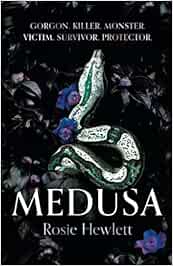3.5 Stars
I’ve read a number of retellings of Greek myths and usually enjoy them so I picked up this book about the infamous monster who turned men into stone with a mere glance. This version is a sympathetic retelling with definite feminist overtones.
The novel is structured as an extended monologue by Medusa from the Underworld. She tells her own story and shows that there is more to her than the things she has been called: “Seductress. Liar. Monster. Killer.” She shows how she was an abandoned child, a priestess, a rape victim, a survivor, and a mother. She proves that she is not the villain, “But history is written by the winners. Or, more simply, history is written by men.”
The villains are the gods. Poseidon rapes Medusa, and then Athena punishes the victim because Athena’s temple was desecrated. Though Athena is told about the rape and Medusa’s powerlessness to prevent it, Athena ignores Poseidon’s guilt and transforms Medusa and her sisters into monsters. Though Medusa dedicated herself to Athena’s service and prayed to her often, Athena never answered her prayers. She appears only when she feels she has been disrespected and her temple defiled. Medusa comes to see the gods as self-centred with no real concern for human beings. Even Perseus is Athena’s puppet who must do as she wishes or she will take vengeance against him.
Medusa emerges as a complex character who has normal emotions and dreams. She suffers pain and makes sacrifices, but is also flawed. She acknowledges her evil deeds (turning men to stone), explaining her rationale: “The real Gods were untouchable . . . So I funneled my bitter hatred through acts I deemed as justice, using my curse to protect women from ever having to endure what I went through. . . . I told myself I was righting the wrongs the Gods never would.” Later she thinks that “I was not trying to destroy men; I was trying to obliterate all memories of that helpless, beautiful, weak Medusa. If I could make the world my victim, then perhaps I could forget what it had felt like to be one.” She wants her audience to remember that “most monsters are made, not born. Perhaps you should remember that next time you encounter one.” She has regrets: “there is one victim who has haunted me since the day I took his life and I believe he will continue to for the rest of my eternity.” Though she is also honest and admits that she was intoxicated with her power and does not regret “most of my actions.”
The writing style is conversational. Medusa speaks in a straightforward manner in modern English. She decides she no longer wants to be the silent victim: “a part of me has been inspired by modern-day voices, those voices that are shaking the very foundations their injustices have been built upon.” Certainly the modern world will find her much of her story relatable: the blaming and shaming and silencing of victims continue: “I was not the first woman to be blamed for a man’s flaws and I certainly will not be the last.”
I enjoyed the book, but I must admit to wanting more. Having read Circe by Madeline Miller (https://schatjesshelves.blogspot.com/2018/09/review-of-circe-by-madeline-miller.html) and The Silence of the Girls by Pat Barker (https://schatjesshelves.blogspot.com/2018/12/review-of-silence-of-girls-by-pat-barker.html), I was hoping for more depth. I think there’s more potential in Medusa’s story, but this retelling is a good beginning.

No comments:
Post a Comment